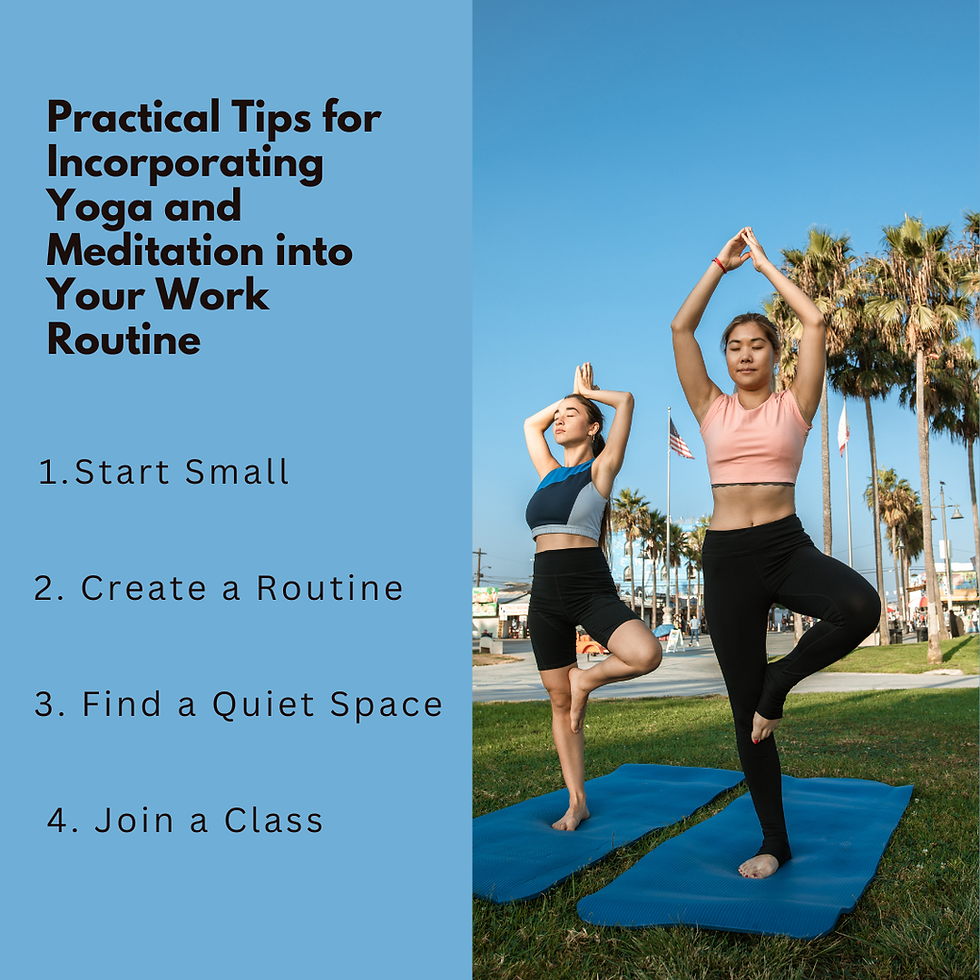Helping ADHD Individuals with Emotional Intelligence Through Yoga and Meditation
- Gretchen Pound, PhD
- Jul 31, 2024
- 4 min read

In today's fast-paced work environment, emotional intelligence (EI) is an invaluable asset. It’s the ability to recognize, understand, and manage our own emotions, and to recognize, understand, and influence the emotions of others. Developing EI can lead to better teamwork, improved communication, and enhanced leadership abilities. Yoga and meditation are powerful tools that can significantly enhance emotional intelligence in the workplace. Additionally, these practices can be particularly beneficial for individuals with ADHD, helping them manage their symptoms and improve their emotional intelligence.
Understanding Emotional Intelligence
Emotional intelligence consists of five key components:
Self-Awareness: Recognizing and understanding our own emotions.
Self-Regulation: Managing our emotions in a healthy way.
Motivation: Being driven to achieve for the sake of achievement.
Empathy: Recognizing and understanding the emotions of others.
Social Skills: Managing relationships to move people in desired directions.
Integrating yoga and meditation into your daily routine can help develop these components.
Yoga: A Path to Self-Awareness and Self-Regulation
Yoga is a mind-body practice that combines physical postures, breathing exercises, and meditation. Here's how yoga contributes to emotional intelligence:
Self-Awareness: Yoga encourages you to tune into your body and mind. As you move through different poses, you become more aware of your physical sensations and emotional responses. This heightened awareness can translate into better self-understanding in the workplace.
Self-Regulation: The practice of yoga teaches you how to control your breath and calm your mind. This ability to regulate your internal state can help you manage stress and respond to workplace challenges with composure and clarity.
Mindfulness: Yoga promotes mindfulness, the practice of staying present in the moment. Mindfulness helps you focus on the task at hand, improves concentration, and reduces the tendency to react impulsively.
Meditation: Cultivating Empathy and Social Skills
Meditation involves focusing your mind and eliminating distractions. It can be practiced in various forms, such as mindfulness meditation, loving-kindness meditation, and guided visualization. Here’s how meditation enhances emotional intelligence:
Empathy: Loving-kindness meditation, in particular, involves directing positive thoughts and feelings towards yourself and others. This practice can increase your capacity for empathy, helping you understand and connect with your colleagues on a deeper level.
Stress Reduction: Regular meditation reduces stress and anxiety, creating a more stable emotional foundation. When you’re less stressed, you’re more likely to respond to others with patience and understanding.
Improved Communication: Meditation enhances your ability to listen and communicate effectively. By cultivating a calm and focused mind, you can engage in more meaningful and productive interactions with your team.
People with ADHD often face unique challenges in the workplace, such as difficulty concentrating, impulsivity, and heightened emotional sensitivity. Yoga and meditation can be particularly beneficial in helping them manage these symptoms and improve their emotional intelligence:
Enhancing Focus and Concentration: Yoga poses and meditation practices that require sustained attention can help individuals with ADHD improve their focus. Practices like pranayama (breathing exercises) can also enhance mental clarity and concentration.
Managing Impulsivity: Yoga and meditation teach mindfulness and self-control. By practicing these techniques regularly, individuals with ADHD can learn to pause and think before reacting, which helps in managing impulsive behaviors.
Reducing Stress and Anxiety: Yoga and meditation promote relaxation and reduce stress, which can be particularly beneficial for individuals with ADHD who may experience higher levels of anxiety. This reduction in stress can lead to a more stable emotional state and better emotional regulation.
Improving Self-Awareness: Through mindfulness practices, individuals with ADHD can become more aware of their emotional triggers and responses. This self-awareness is crucial for developing better self-regulation and empathy.
Supporting Emotional Regulation: Techniques such as deep breathing and progressive muscle relaxation can help individuals with ADHD regulate their emotions more effectively. This can lead to improved interactions with colleagues and a more positive work environment.
Practical Tips for Incorporating Yoga and Meditation into Your Work Routine
Start Small: Begin with a few minutes of meditation or simple yoga stretches each day. Gradually increase the duration as you become more comfortable with the practice.
Create a Routine: Set aside specific times during your day for yoga and meditation. Consistency is key to reaping the benefits.
Use Apps and Online Resources: There are many apps and online videos available that offer guided yoga and meditation sessions tailored to different levels and needs.
Find a Quiet Space: Designate a quiet, comfortable space in your workplace where you can practice yoga and meditation without distractions.
Join a Class: If possible, join a yoga or meditation class. Practicing with others can provide additional motivation and support.
Conclusion
Yoga and meditation are not just beneficial for your physical and mental well-being; they are also powerful tools for developing emotional intelligence. By fostering self-awareness, self-regulation, empathy, and social skills, these practices can enhance your ability to navigate the complex emotional landscape of the workplace. For individuals with ADHD, yoga and meditation can offer additional support in managing symptoms and improving focus, impulsivity, and emotional regulation. Start integrating yoga and meditation into your daily routine and witness the positive impact on your professional life.
If you have ADHD and would like to learn more about how to grow your Emotional IQ contact Dr. Gretchen at gretchen@healthierlifecoaching.com.
And Remember
"I want to make a difference in people’s lives!
I work to ensure everyone has an
equal opportunity to succeed."
-- Gretchen Pound, PhD
